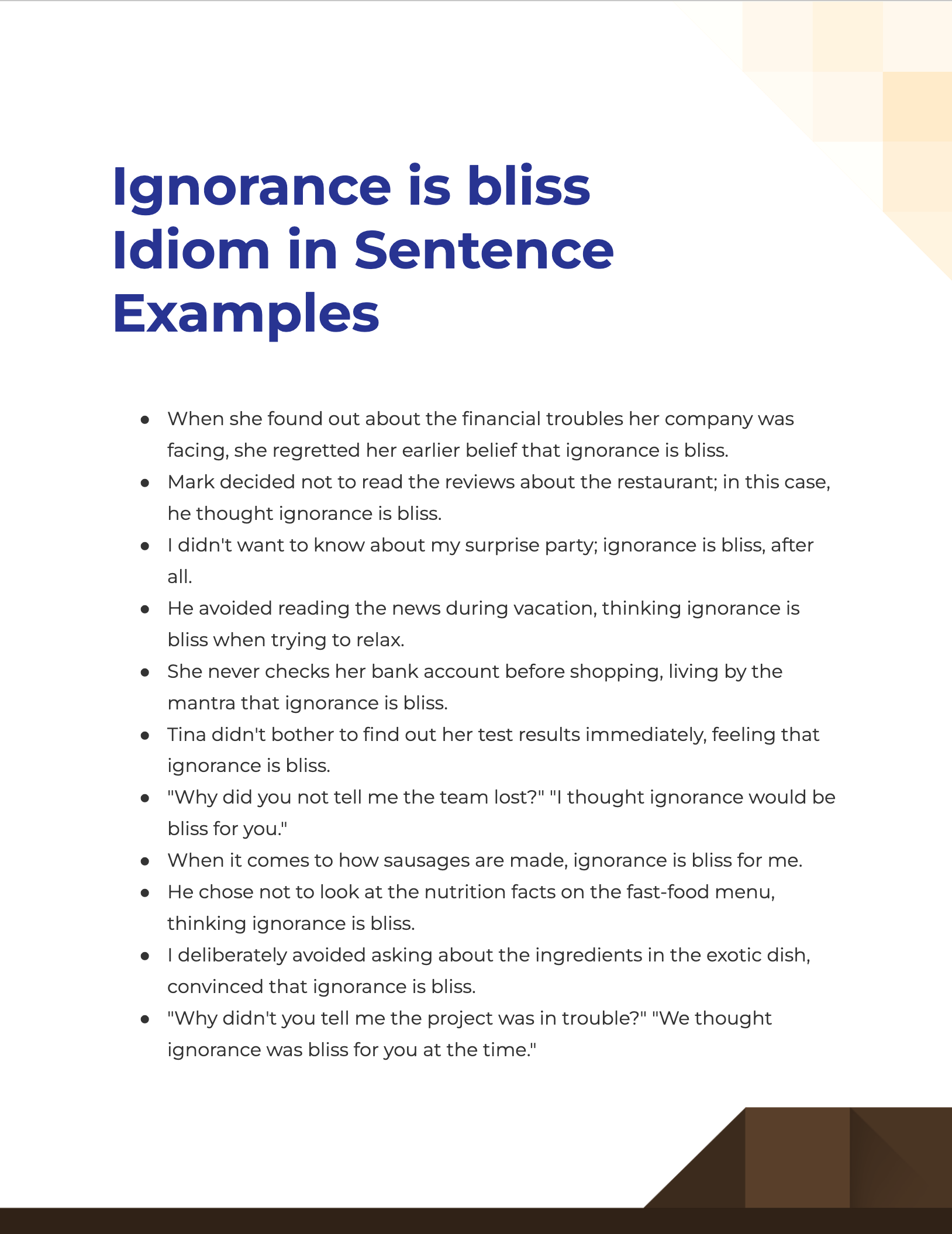19+ Ignorance is bliss Idiom Examples
Delve into the fascinating world of idioms with our comprehensive guide on “Ignorance is Bliss.” This well-known saying has captivated minds for generations, and we’re here to dissect its layers. Explore its origins, its nuanced meaning, and its practical applications in daily life. From unique idiom example sentence to actionable tips, this guide is your ultimate resource for understanding and using the idiom effectively.
What is the Ignorance is Bliss Idiom? – Definition
“Ignorance is Bliss” is an idiom that suggests that lack of knowledge or awareness can lead to happiness or peace of mind.
What is the Meaning of Ignorance is Bliss Idiom?
This idiom suggests that sometimes not knowing the truth can actually make you happier. It is often used in situations where knowledge of a certain reality might cause stress, worry, or disappointment.
Origin of Ignorance is Bliss Idiom
The idiom “Ignorance is Bliss” originates from a poem by Thomas Gray titled “Ode on a Distant Prospect of Eton College,” published in 1742. The phrase has since been used in various contexts, often to rationalize avoiding uncomfortable or complex truths.
20 Best Sentence Examples with Ignorance is bliss Idiom

- When she found out about the financial troubles her company was facing, she regretted her earlier belief that ignorance is bliss.
- Mark decided not to read the reviews about the restaurant; in this case, he thought ignorance is bliss.
- I didn’t want to know about my surprise party; ignorance is bliss, after all.
- He avoided reading the news during vacation, thinking ignorance is bliss when trying to relax.
- She never checks her bank account before shopping, living by the mantra that ignorance is bliss.
- Tina didn’t bother to find out her test results immediately, feeling that ignorance is bliss.
- “Why did you not tell me the team lost?” “I thought ignorance would be bliss for you.”
- When it comes to how sausages are made, ignorance is bliss for me.
- He chose not to look at the nutrition facts on the fast-food menu, thinking ignorance is bliss.
- I deliberately avoided asking about the ingredients in the exotic dish, convinced that ignorance is bliss.
- “Why didn’t you tell me the project was in trouble?” “We thought ignorance was bliss for you at the time.”
- When faced with the risks of skydiving, some might say ignorance is bliss.
- Sarah didn’t want to hear any spoilers about the new movie; for her, ignorance is bliss.
- In relationships, sometimes ignorance is bliss; not everything needs to be analyzed to death.
- I skipped reading the side effects of the medication, thinking ignorance is bliss.
- Julie decided not to pry into her friend’s marital issues, subscribing to the idea that ignorance is bliss.
- They didn’t tell their children about the looming financial crisis; in this instance, they believed ignorance is bliss.
- “Why don’t you want to know about your competitors?” “In this case, ignorance is bliss.”
- Mike didn’t bother learning about the challenges he was about to face in his new job, assuming ignorance is bliss.
- Ignorance is bliss when it comes to some of the challenges you’ll face in adulthood; there’s no need to worry about them when you’re still a kid.
More Famous Idioms with Meaning, Sentence Examples
- Play It by Ear Idiom
- In Black and White Idiom
- Crocodile Tears Idiom
- Full of Beans Idiom
- Busy as a Bee Idiom
- Snake in the Grass Idiom
- Once in a blue moon
- Break a leg Idiom
- Beat around the bush Idiom
- Bite the bullet Idiom
- Through thick and thin Idiom
- Actions speak louder than words Idiom
- Go down in flames Idiom
- Jump on the bandwagon Idiom
- Call it a day Idiom
- It takes two to tango Idiom
- A blessing in disguise Idiom
- Come rain or shine Idiom
- On cloud nine Idiom
- Better late than never Idiom
- Hit the sack Idiom
- Go the extra mile Idiom
- The Whole Nine Yards Idiom
- A penny for your thoughts Idiom
- Pull someone’s leg Idiom
- As right as rain Idiom
- Throw caution to the wind Idiom
- Kick the bucket Idiom
- Take a rain check Idiom
How to Use Ignorance is bliss Idiom in Sentences?
The idiom “Ignorance is bliss” is often used to express the idea that not knowing something spares you from the associated worry or responsibility. However, it’s important to understand when and how to use it appropriately in sentences to convey the intended meaning effectively. Here are some guidelines:
- Context is Key: Make sure you use this idiom in a context where it’s clear that lack of knowledge is preferable to knowing the unpleasant truth.
- Negative and Positive Usage: The idiom can be used both negatively and positively. In a positive sense, it can imply that not knowing about something can lead to peace of mind. In a negative sense, it can suggest that someone is choosing to remain ignorant to avoid facing reality.
- Grammatical Structure: This idiom can be used as a standalone sentence, part of a larger sentence, or as a clause within a sentence. For example:
- Standalone: “Ignorance is bliss.”
- Within a sentence: “I chose not to look at my grades yet, thinking ignorance is bliss.”
- Question Form: You can also pose it as a question to suggest the idea rhetorically. For example, “Is ignorance bliss in this situation?”
- Variations: While the idiom itself is quite straightforward, slight variations in phrasing can be used to fit specific situations. For example, “In this case, ignorance is bliss.”
- Combining with Other Sentences: Use semicolons, commas, or conjunctions to combine the idiom with related ideas. For example, “He didn’t want to know the score; ignorance is bliss.”
Tips for Using Ignorance is bliss Idiom
- Know Your Audience: Make sure that the audience understands the idiom or the context well enough for the meaning to be clear.
- Avoid Overuse: Since this idiom is quite popular, try not to overuse it, especially in formal or scholarly writings.
- Emphasize With Tone: If you’re using it in speech, your tone can help emphasize whether you’re using it in a serious or ironic manner.
- Pair with Examples: When using the idiom, it may be effective to immediately follow it with an example that demonstrates the idea you’re trying to express.
- Idiom in Titles: It makes for an effective title for articles or presentations that discuss the pros and cons of knowing too much about a given topic.
- Use in Dialogue: It’s a common idiom used in everyday conversations, so it can make fictional dialogue more realistic.
- Subtlety in Business: When discussing sensitive topics in a business setting, use it cautiously. It could imply a lack of responsibility if not framed correctly.
By understanding how to use “Ignorance is bliss” properly, you can make your conversations and writings more dynamic and nuanced. It’s a powerful idiom that, when used effectively, can add depth to your language.



